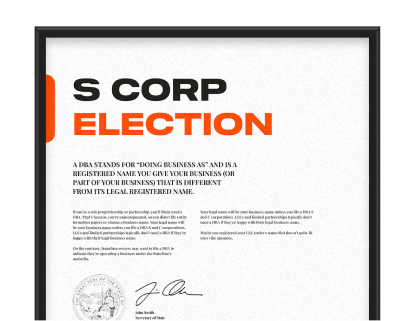On this page
Business Taxes
How Your Corporation Will Be Taxed
In this guide, you'll learn about the main types of tax in Colorado that apply to corporations, including sales, self-employment, corporate and federal taxes.
How your corporation is taxed will depend on whether it's an S Corp or a C Corp.
Colorado State Tax
There are two types of Colorado tax you must pay to the CO Department of Revenue: income and sales. Depending on how your business is set up, you may also need to pay use tax.
Important: All of these taxes apply whether you have a C Corp or an S Corp.
Colorado Income Tax
Anyone who takes earnings out of your corporation will need to pay CO income tax and will be taxed at the state's standard rates. Any employees will also need to pay state income tax. The state of Colorado currently operates on a flat rate income tax of 4.55 percent.
Any taxable income will be taxed at that rate and is payable to the CO Department of Revenue, Taxation Division.
Colorado Corporate Income Tax
The state of Colorado imposes a tax on the net income of any C Corporation that is doing business in the state. The tax applies to every C corporation that is organized or commercially domiciled in Colorado and to every C corporation that has property, payroll, or sales in Colorado in excess of certain thresholds.
Just like the individual income tax rate, the corporate income tax is taxed at a flat rate of 4.55 percent. However, under certain circumstances involving fiscal year state revenues in excess of limitations established in the state constitution, the income tax rate for future tax years may be temporarily reduced to 4.5 percent.
Colorado Sales and Use Tax
These tax types are similar enough that they're often categorized together. It's still important to understand the differences between them.
Colorado Sales Tax
If you sell physical products (such as electronics, books, cars, furniture, appliances, raw materials, etc.) or certain services, you may need to collect CO sales tax at the point of purchase. You'll remit the taxes you collect to the CO Department of Revenue, Taxation Division.
Most states, including Colorado, don't levy sales tax on goods considered to be necessities, such as gas, clothing, medication and some grocery items. The state's tax code, in C.R.S. Title 39, Art. 26, Pt. 7, contains an extensive list of items exempt from Colorado sales tax.
The CO sales tax rate is 2.9 percent statewide. Local taxing jurisdictions (cities, counties and school districts) may impose additional sales tax at varying rates. You can use several resources provided by the Department of Revenue to lookup local tax rates for a specific geographical location.
Use our sales tax calculator to get an idea of what you'll need to pay, but always check with your accountant and the Colorado Department of Revenue to find out whether your business is required to collect sales tax and ensure you remain in compliance.
CO Use Tax
If you purchase physical products outside the state for use in Colorado from a seller who doesn't charge Colorado sales tax, you may need to pay use tax. You may also hear this referred to as the Colorado sales and use tax.
For example, if you buy furniture for your corporation from a company in a state that either doesn't have a sales tax or has a sales tax that is lower than the CO sales tax, you'll be responsible for paying the CO use tax.
The current Colorado use tax rate is 2.9 percent, and local municipalities may add their own use tax in addition to the state's rate. All Colorado sales and use tax is paid directly to the CO Department of Revenue.
Federal Taxes for Corporations
Federal taxes can be complicated, so speak to your accountant or professional tax preparer to ensure that your Colorado corporation is paying the correct amount, and that you're paying the correct individual amount.
Federal Self-Employment Tax
Whether and how you pay this tax depends on whether you have a C Corp or an S Corp.
Federal Taxes for C Corps
All shareholders who earn wages or a salary from a C Corporation must pay self-employment tax. This tax is administered by the Federal Insurance Contributions Act (FICA) and covers Social Security, Medicare and other benefits. The current self-employment tax rate is 15.3 percent.
You’ll be able to deduct some of your business expenses from your income when calculating how much self-employment tax you owe.
Here are some examples of how much self-employment tax you may need to pay, depending on your earnings:
- On a salary of $26,000, you would pay $3,978.
- On a salary of $36,000, you would pay $5,508.
- On a salary of $76,000, you would pay $11,628.
- On a salary of $96,000, you would pay $14,688.
Federal Taxes for S Corps
The Internal Revenue Service may allow your business to be treated as an S Corporation for tax filing purposes, provided it meets certain requirements. This can help you reduce the amount of self-employment tax you pay by allowing you to declare some of your income as salary (on which you'll pay self-employment tax) and other income as distributions (which are not subject to self-employment tax).
Speak to your accountant or professional tax preparer for more information on reducing your tax burden through an S Corporation tax election.
Treating Your Business as an S Corp Can Help You Save Money.
We can file the paperwork with the IRS on your behalf.
File an S Corp Tax Election
Federal Income Tax
You must pay regular federal income tax on any wages or salary your corporation pays you, regardless of its type. The amount of income tax you pay depends on your earnings, current income tax bracket, deductions and filing status.
Speak to your accountant or tax professional for more information.
Taxes Specific to C Corporations
Regardless of the state where your corporation is based, corporate taxes can get pretty complicated. We provide some basic information here, but we strongly encourage you to consult with a tax professional to ensure your corporation pays the right taxes in the right amounts to help you avoid penalties, fines and, worst of all, tax audits.
Corporate Tax
Unlike a limited liability company or an S Corporation, a C Corporation is required to file a corporate tax return and pay taxes on any profits.
When those profits are paid to shareholders as dividends, they will also be subject to taxation on the shareholders' personal tax returns.
This is often referred to as “double taxation” and is one reason many business owners prefer to file their taxes as S Corporations.
Note: It is possible for a C Corp to file taxes as an S Corp. Consult with your accountant or professional tax advisor for more information.
Stock Dividends
A C Corporation may pay shareholders dividends as a share of the profits of the company. The value of dividends to which each shareholder is entitled depends on how many shares they own.
Dividends distributed to shareholders are taxed twice — first at the corporate level as profit (on the corporation’s Form 1120, the U.S. Corporation Income Tax Return) and again at the individual level as stock dividends (on the shareholder's Form 1040, the U.S. Individual Income Tax Return).
Taxes Specific to S Corporations
You must pay federal income tax on both your salary and any distributions you take from the business.
Need Someone to File Your Corporate Taxes?
Bizee provides a complete Business Tax Filing service.
Get Help with Taxes
Employee and Employer Taxes
If you pay employees, there are some slightly different tax implications. Speak to your accountant to get clear guidance for your unique situation.
Employer Payroll Tax Withholding
All employers are required to withhold federal taxes from their employees’ wages. You’ll withhold 7.65 percent of their taxable wages, and your employees will also be responsible for 7.65 percent, adding up to the current federal tax rate of 15.3 percent.
Speak to your accountant for more information.
Employees May Need to File Tax Returns
Regardless of whether you withhold federal and state income tax, your employees may need to file their own tax returns.
Employee Insurance and Other Requirements
You may also need to pay insurance for any employees, such as employee compensation insurance or unemployment tax.
Other Taxes and Duties
Depending on your industry, you may be liable for certain other taxes and duties. For example, if you sell gasoline, you may need to pay a tax on any fuel you sell. Likewise, if you import or export goods, you may need to pay certain duties.
Speak to your accountant about any other taxes or duties you may need to withhold or pay.
Estimated Taxes
Most corporations must pay estimated taxes throughout the year—on a quarterly basis—depending on the amount of profit and income you expect to make. Per the IRS:
"Corporations must generally make estimated tax payments if they expect their estimated tax (income tax less credits) to be $500 or more."
The most common types of estimated tax are:
- Federal income tax
- Federal self-employment tax
C Corporation
If you expect to owe $500 or more in income tax, you must make four quarterly estimated tax payments to the IRS. You'll estimate your total tax on Form 1120-W, then pay 25% on each due date. Please note that the IRS will no longer be updating Form 1120-W, so follow up with your accountant with any questions on estimated tax payments after 2023.
Important: This applies to you as the owner of the C Corporation, not the business itself. A C Corporation does not pay income tax.
S Corporation
It's a little less straightforward for an S Corp, which will pay estimated taxes by filing an IRS Form 1120-S, which is the income tax return form for S Corps.
Also, as the owner of an S Corp, you'll need to make estimated payments on self-employment tax.
Learn more on the IRS website, and speak to your accountant for more information. Or use Bizee’s Business Tax Filing service.
We Can Help You Navigate Complex Tax Situations and Avoid Costly Mistakes With Our Complete Business Tax Filing Service
Get Help with Corporate Taxes
FAQs on Colorado Taxes
Is There a Colorado Sales Tax?
Yes. Colorado does have a sales tax, which may vary among cities and counties. Depending on how you run your business, you may also need to pay use tax. You can find more information above.
Is There a Colorado Income Tax?
Yes. The State of Colorado does have an income tax. You can find more information above.
Is There a CO Franchise Tax?
No, there is no CO Franchise Tax. Corporations are required to pay Corporate Income Tax, however. You'll find more information above.
Do I Need to Pay Estimated Taxes?
Yes. In most cases, you must pay estimated taxes to the federal government, whether you run a C Corp or an S Corp. You'll find more information above.
incorporate now
Launch your business with bizee
No Contracts. No Surprises. Only $0 + State Fee to Launch Your Business.
